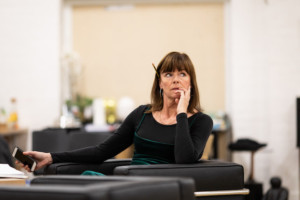Interview: Doon Mackichan Talks David Mamet's BITTER WHEAT

Doon Mackichan's previous work includes iconic TV series Smack the Pony and shows like Jumpy at the Royal Court. She's currently starring in David Mamet's new play Bitter Wheat at the Garrick Theatre, which features John Malkovich as a Harvey Weinstein-esque Hollywood mogul.
What first attracted you to the project?
The subject is very close to my heart - I'm a bit of a campaigner and an activist, and I've spoken on the subject of sexual violence and so on. And of course, getting to work with David Mamet - I studied him at university!
Did you have any reservations about it being the right time to tell this story in drama?
It's a controversial subject, isn't it? Of course a lot of people are very hurt, and then at the moment we're seeing some the Harvey Weinstein cases being settled. If you've had your life stolen on some level by sexual assault, you might think a financial reward will in some way help you feel better, rather than pursuing a prosecution, but we've also historically seen women accepting payoffs and essentially being silenced.
But prosecution has so many barriers. Helena Kennedy wrote an excellent book Eve Was Shamed, which talks about how the justice system has completely failed women in this country. It's the same in America - the Weinstein trial was pushed back, they managed to close the court, it's all weighted against women.
It's very important to be talking about and grappling with something that's deeply uncomfortable and very current, on many levels. Let's hope women are more protected in the workplace because of #MeToo, and feel more empowered to speak out. It does feel like a sea change.
%20in%20Bitter%20Wheat%20(pic%20Helen%20Maybanks).jpg)
Tell us about your character Sondra
She's a long-term PA of a movie mogul, whose career starts falling apart because of sexual misconduct allegations. She's been a gatekeeper, a wingwoman for a long time. It's hard to play - it's almost more controversial than a man in this situation, because she's allowed things to happen in plain sight.
What sort of woman would do that? It's like asking who would let Jimmy Saville into the hospital room. But it's important to look at the whole system and how people got away with things for so long - not just the individuals.
It's still happening, but it's really good that we're starting to address it more. Like recently, there was a story about a woman in Afghanistan who reported her husband for assault, and this brilliant female police officer who got her into a safe house and went round and terrorised the husband! That wouldn't have been on the news six months ago.
How did you research your role?
I spoke to a former employee of a very powerful man - I can't say who. And to other people who were very close to very powerful people. The sad thing is most women you talk to will have had some experience of this in the workplace, whether it's a small or a big thing. But the key thing is looking at how power affects them - how they feel now, what the long-term effect is of that bullying culture on a woman's psyche.
It's about control - in the home, too. "You will do what I want because I say so." People checking into clinics for sex addiction - that's often more about power. So the play really digs into how and why a powerful person operates, and the ripple effect of that.
Mamet obviously has form writing about power dynamics...
Absolutely. You look at Glengarry Glen Ross - it's about salesmen down on their luck, trying hard to get back not just professional success, but power. Mamet's really interested in the male dynamic and how power is entwined with masculinity.
%20pic%20by%20Helen%20Maybanks.jpg)
Was it hard to find the right tone for the play? John Malkovich has described it as a "black farce"
Tone is everything. "Farce" is a difficult word when you're dealing with this subject matter, and with the countless sufferers.
Here, it's specifically the man who's losing his power when he usually gets away with it - it's funny in the sense of seeing him in this situation, the way things spiral out of control, and yet not funny because he's done it for a long time. It's really about his psychology and how he operates. There's an energy and absurdity, but a depth to it too.
Then the audience will also decide the tone as well. Some bits are very, very dark - so will they be shocked or laughing?
Do you think theatre should be tackling sensitive topics like this?
You can change minds if you take on difficult subject matter, but make it accessible. Like with Smack the Pony, we didn't do any material that was specifically about sexual politics, but it was hugely liberating because it was women being funny and it made big points without making people switch off.
With Bitter Wheat, I can understand people will have different responses to it, particularly sufferers, but I really hope they stay to the end of the play and see what we're trying to do. I'm over the moon to be part of something that gets these very important conversations going.
Of course, we do need stories specifically about the victims too, and it would be great to be part of a woman's story when the National or someone commissions it...! But I'm very proud of this play and I hope people find it engaging and take the right message from it.
Bitter Wheat at the Garrick Theatre until 21 September
Photo credit: Helen Maybanks
Comments



